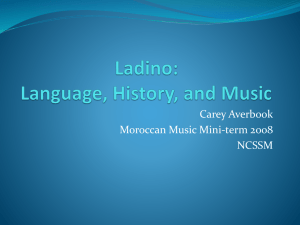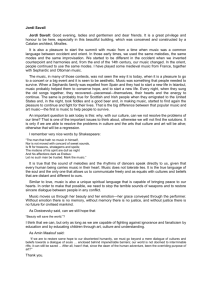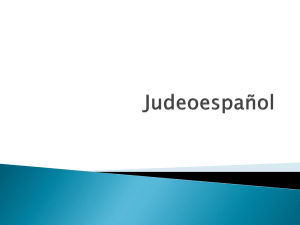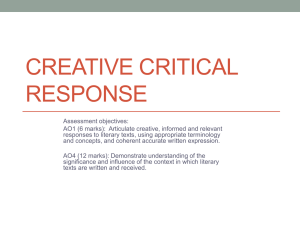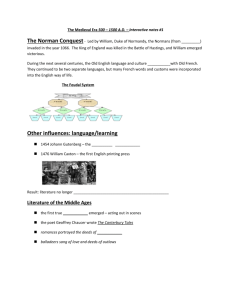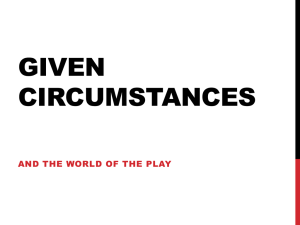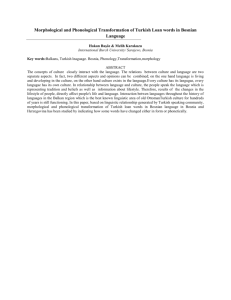The efforts of Laura Papo Bohoreta in maintaining the Judeo
advertisement
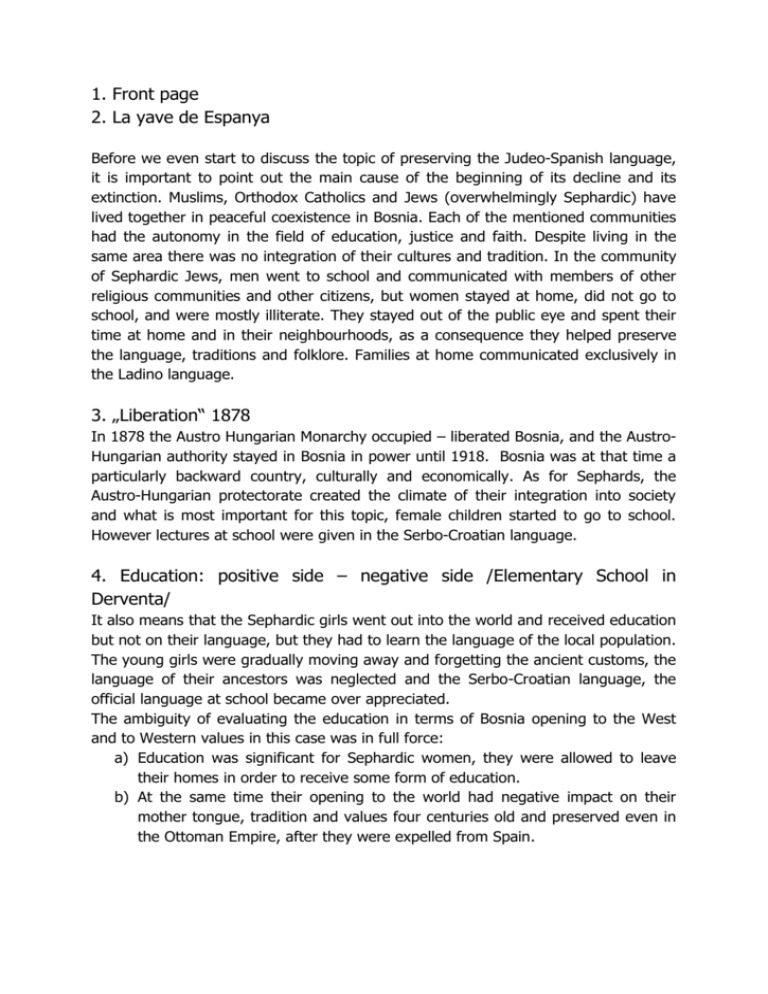
1. Front page 2. La yave de Espanya Before we even start to discuss the topic of preserving the Judeo-Spanish language, it is important to point out the main cause of the beginning of its decline and its extinction. Muslims, Orthodox Catholics and Jews (overwhelmingly Sephardic) have lived together in peaceful coexistence in Bosnia. Each of the mentioned communities had the autonomy in the field of education, justice and faith. Despite living in the same area there was no integration of their cultures and tradition. In the community of Sephardic Jews, men went to school and communicated with members of other religious communities and other citizens, but women stayed at home, did not go to school, and were mostly illiterate. They stayed out of the public eye and spent their time at home and in their neighbourhoods, as a consequence they helped preserve the language, traditions and folklore. Families at home communicated exclusively in the Ladino language. 3. „Liberation“ 1878 In 1878 the Austro Hungarian Monarchy occupied – liberated Bosnia, and the AustroHungarian authority stayed in Bosnia in power until 1918. Bosnia was at that time a particularly backward country, culturally and economically. As for Sephards, the Austro-Hungarian protectorate created the climate of their integration into society and what is most important for this topic, female children started to go to school. However lectures at school were given in the Serbo-Croatian language. 4. Education: positive side – negative side /Elementary School in Derventa/ It also means that the Sephardic girls went out into the world and received education but not on their language, but they had to learn the language of the local population. The young girls were gradually moving away and forgetting the ancient customs, the language of their ancestors was neglected and the Serbo-Croatian language, the official language at school became over appreciated. The ambiguity of evaluating the education in terms of Bosnia opening to the West and to Western values in this case was in full force: a) Education was significant for Sephardic women, they were allowed to leave their homes in order to receive some form of education. b) At the same time their opening to the world had negative impact on their mother tongue, tradition and values four centuries old and preserved even in the Ottoman Empire, after they were expelled from Spain. 5. Ladino at the beginning of the twentieth century in Bosnia – /Isak Samokovlija/ Ladino is the language mostly spoken among the family members. Uneducated women could not speak any other language, and for young girls who started to go to public schools Ladino became a second language which they started to ignore, not only because at school they had to speak Serbo Croat, but their attitude toward Ladino changed, they considered it as less important language, and to speak in public Ladino for them became something shameful. But why? Reason is simple, their mothers and grandmothers who were mostly illiterate spoke Ladino, and the young girls considered themselves educated. The situation became contradictory: rather than nurturing the real jewel of the language, the symbol of their survival, the symbol of their faith, they became ashamed of it. Many writers at that time supported that opinion, for example Isak Samokovlija who wrote exclusively in the Serbian language, openly opposed the efforts of preservation „the language that is not even ours“. Samokovlija's opinion is best illustrated in one of his articles „Jewish Life and its Meaning“1: ...we condemned ourselves to a ghetto of our pseudo mother tongue. And not so much a religion but Spanish dialect (meaningless to others) bears the main guilt that we have not progressed, and now we find ourselves in a time full of hidden forces that are more destructive than creative. Sarajevo's Sephardic Cercle: Vita Kajon, Kalmi Baruh, Eliezer Levi and 6. Laura Papo Bohoreta /Bohoreta photo/ /Elvira/ Laura Papo Bohoreta, writer, and the only women's and human rights activist in Bosnia at that time, and at the same time strong supporter of preserving the JudeoSpanish language, determined to preserve the folk treasures, was the only person aware of the ambiguous effects of the education for women. She has written a dozen plays (some have only recently been discovered), a large number of articles and monograph about the Sephardic woman. She was determined that women had to be educated in order to earn money and support their families-it was particularly important at the time – between the two wars, at the height of the global crisis, which was particularly felt in Bosnia. Apart to her first drama Elvira, written in French, and several articles written in German, all her plays and works were written in Ladino. 1 Jevrejski život, Sarajevo, 1925, number 53, page 4. 7. Elvira 8. Actions undertaken by Laura Papo Bohoreta to preserve Ladino She wrote plays. Why plays and not books? a) Spoken word was a force that can reach the audience; it is a direct communication with the hearts and minds of the audience. b) She was well aware of the fact that numerous women were still illiterate, and the book for them had no meaning at all and the play performed in a theatre would be a welcome destruction from everyday housework. c) The fact that classes for young Sephards were held in Serbo-Croatian language, their mother tongue regressed and was replaced by the SerboCroatian language. d) The themes of her plays were everyday events familiar to everybody. The audience could identify with the characters of her plays, and they were reminded on words, phrases (almost forgotten) spoken among their family members. 9. In what way she tried to preserve Ladino? a) The words she used in her plays were simple and understandable to the audience – for example: b) Her sentences were short and simple- example: c) Introducing many proverbs, the purpose of reviving and maintaining the Sephardic tradition – example: d) Music, singing and dancing were always part of her plays – example: . 10. Singing and dancing Petar Guberina, (1913 – 2005) Croatian linguist and phonetician, in the middle of the last century insisted on audio-visual-global and structural (SGAV) method of learning foreign languages, the method became appreciated all over the world. We learn faster and better remember words through rhythm and music. Today in the twentyfirst century, teachers still use the same method in teaching foreign languages, aware that in this way students learn vocabulary, phrases and whole sentences quickly and with less effort. Bohoreta was aware of those things one hundred years ago. 11. Announcement in Jevrejski život March 1930 12. Announcement in Jevrejski život October 1930 It is not a coincidence that music, singing, dancing are present in her one-act plays (Avia de ser, Pasensija vale mučo, Tjempos pasados) as well as in her three-act plays (Elvira, Ožos mios, Shuegra ni de baro buena, Esterka, Madrasta el nombre le abasta). I disagree with some of her biographers claiming that her main goal was to preserve the folklore and tradition. I believe that her main concern was to preserve Ladino from the oblivion. Since she belonged to the Sephardic circle of intellectuals (Kalmi Baruh, Vita Kajon, Eliezer Levi, Avram Pinto...) who opposed the revival of a single Hebrew language in Eretz- Israel, fully aware that this would be a final blow to Ladino, her fight to preserve the language is not something unexpected. . 13. Aware of the reality /Eskariño/ We have already seen the contradictions in the work of Laura Papo Bohoreta: she encouraged women to education, and at the same time she tried to preserve their mother tongue from the oblivion; she was an idealist but also a very down to earth woman, she proved by her own life that a woman can support her family. In the recently discovered play Eskariño, Bohoreta showed the complexity of the issues related to the language, as well as departure of Jews to Israel. In the mentioned play the mother speaks to her daughter in Ladino and a girl answers her in the SerboCroatian language. And it is not by chance that the mother encourages her daughter to learn by heart a poem by Aleksa Šantić „Stay Here“. I am also of the opinion that the recently found play by Bohoreta „Eskariño“, written in 1937, was never performed on stage, because of her opposition to the exodus of the Jews to Israel. She tells them „Stay Here.....“ 14. Stay Here – Kedat aki 15. Ostajte ovdje – Aleksa Šantić
